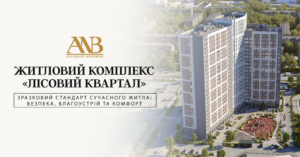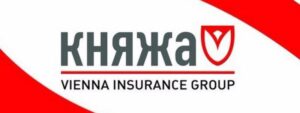
On August 18, 2025, the State Inspectorate of Architecture and Urban Development of Ukraine issued certificate ІУ123250807346, which confirms the commissioning of house No. 3 of the Krona Park II residential complex in Brovary.
This means that the building fully complies with the project documentation and is ready to welcome its residents. The next step is to assign a mailing address and hand over the keys to the happy apartment owners.
Krona Park II is a continuation of the legendary Krona Park project, created with the wishes of our customers in mind. Living next to a park and a coniferous forest, combined with convenient connections to the capital, is the perfect formula for modern comfort.
Today, 7 more houses of the complex are under construction, and we are sure that even more good news is ahead.
Thank you for your trust! We wish you a cozy and happy life in your new home by Alliance Novobud.

Lesniy Kvartal Residential Complex received an honorary award from the professional community – the Ukrainian Construction Olympus Award. The complex was recognized in the nomination “Exemplary standard of modern housing: safety, improvement and comfort”.
This award emphasizes the high level of architectural solutions, quality of construction and an integrated approach to creating a comfortable environment for residents.
In July, we started accepting applications for the purchase of apartments in the final building of the residential complex. This is the final stage of a large-scale project that has become one of the most popular in Brovary.
Iryna Mikhalova, CMO of Alliance Novobud, commented on the event: “This award is an important confirmation that we are moving in the right direction. “Lesniy Kvartal was created as a modern space for living – with well-thought-out layouts, its own infrastructure, landscaping and care for the safety of residents. The fact that the complex has been recognized by experts and, most importantly, the trust of buyers is of the greatest value to us. We are glad that the final house will be the final accent in the development of this successful project.”

In 2024-2025, medium and large businesses in Ukraine will more often choose private clouds – due to the requirements for data control and compliance with security standards. The trend has intensified against the backdrop of war and regulatory requirements, notes Volodymyr Bjelov (GigaCloud) in a column for Interfax-Ukraine.
The key change is the transition from “formal incident plans” to built-in cybersecurity: PAM, SIEM, SOC, encryption, DDoS protection are now considered at the level of cloud solution architecture, rather than as an “add-on”.
GigaCloud is a Ukrainian cloud provider (part of GigaGroup), founded in 2016. The company provides IaaS/PaaS services, virtual data centers, redundancy and continuity solutions (DR/BCP) and GPU clouds. The infrastructure is hosted in data centers in Ukraine and the EU (Kiev, Lviv, Warsaw) with TIER III/IV compliance; the provider has VMware Cloud Service Provider (Premier) statuses and is registered in CSA STAR Registry, portfolio – over 1.5 thousand customers.
ARCHITECTURE, BUSINESS, GigaCloud, private clouds, SECURITY, Vladimir Bjelov

Ukrainian companies in 2025 have noticeably stepped up the implementation of artificial intelligence solutions, but the growth is limited by the lack of specialized specialists and access to infrastructure with NVIDIA GPUs, which have become the “de facto standard” for AI projects. Volodymyr Bjelov, Country Director of GigaCloud in Ukraine, writes about this in his column for Interfax-Ukraine.
According to him, the demand for AI is becoming a key driver of cloud services, but at the same time the requirements for security and business continuity are growing, which shifts the focus from pilots to industrial implementations.
GigaCloud is a Ukrainian cloud provider (part of GigaGroup), founded in 2016. The company provides IaaS/PaaS services, virtual data centers, redundancy and continuity solutions (DR/BCP) and GPU clouds. The infrastructure is hosted in data centers in Ukraine and the EU (Kiev, Lviv, Warsaw) with TIER III/IV compliance; the provider has VMware Cloud Service Provider (Premier) statuses and is registered in CSA STAR Registry, portfolio – over 1.5 thousand customers.
https://interfax.com.ua/news/blog/1096980.html
AI-projects, NVIDIA GPUs, UKRAINIAN BUSINESS, Volodymyr Bjelov

Last week, the National Bank of Ukraine (NBU) reduced sales of dollars on the interbank market by $234.8 million, or 27.9%, to $607.8 million, according to statistics on the regulator’s website.
According to the data released by the National Bank, last week the negative balance of buying and selling of foreign currency by banks’ legal entities increased from $43.2 million on Monday to $103.1 million on Thursday, which is almost half as much as last week.
A similar situation was observed in the market of foreign exchange transactions of households: while on Saturday-Monday, sales of foreign currency exceeded purchases by $7.6 million, on Thursday it was $10.5 million, while last Thursday this figure reached $27.5 million.
While a week earlier, for the first time in a long time, a negative balance was recorded in the segment of non-cash transactions of households, last week households again sold more non-cash currency than bought it – by $2-5 million daily.
The official hryvnia exchange rate against the dollar strengthened from 41.3895 UAH/$1 to 41.3401 UAH/$1 last week.
The same dynamics was observed in the cash market, where the hryvnia strengthened by 3-5 kopecks last week: buying to about 41.37 UAH/$1, and selling to about 41.45 UAH/$1.
“The Ukrainian currency market in terms of the dollar is in a calm phase – international factors do not provide drivers for drastic changes, while dosed interventions and liberalization of the NBU maintain low volatility and market controllability,” experts of KYT Group, a major participant in the cash foreign exchange market, said.
According to their estimates, domestic demand is stable without any hype or accumulative drivers, importers act in a planned manner without provoking abnormal outbursts, and there are fewer or no “insurance” margins of market operators in the hryvnia-dollar quotes.
For the next 1-3 weeks, KYT Group expects the exchange rate to remain in the basic range of UAH 41.30-41.85/$1: a break below UAH 41.20/$1 is unlikely without a strong external catalyst, but short impulses are possible based on data from the US or news about external financing for Ukraine.
In the medium term, for 2-3 months, the company expects the exchange rate to be 41.50-42.20 UAH/$1 and adds that the expectation of the September Fed decision with a likely but far from guaranteed rate cut shifts expectations for quotes to the lower end of the corridor. At the same time, autumn budget payments and energy imports may push quotes up, but the start of the export season and its success is a strong stabilizing factor.
“If the scenario of increased uncertainty (security, economic indicators, political shifts) or deterioration of external revenues is realized, short exits to 42.30-42.40/$1 are likely,” KYT Group experts believe.

Insurance company Knyazha Vienne Insurance Group (Knyazha VIG”, Kyiv) in January-June 2025 collected UAH 1.808 billion of insurance payments, which is 58.61% more than in the same period a year earlier, net premiums amounted to UAH 1.161 billion (+17.21%). This information has been published by Standard-Rating, having confirmed the financial strength/credit rating of the insurer at the level of “uaAA+” following the results of the specified period.
According to the RA website, for the specified period receipts from individuals have grown by 61,71% – up to UAH 1,310 billion, and from reinsurers – by 77,13%, up to UAH 3,943 mln.
According to the results of the first half of 2025, the share of individuals in the gross premiums of the company amounted to 72,43%, and the share of reinsurers – 0,22%.
Insurance payments sent to reinsurers, for the first half of 2025 compared to the same period of 2024 have increased more than in 4,3 times – up to UAH 646,786 mln. Thus, the ratio of reinsurance companies’ participation in insurance premiums has increased by 22,69 p.p. up to 35,78%. – up to 35,78%.
The volumes of insurance payments and indemnities made by the company in the first half of 2025, compared to the same period of 2024, have increased by 39,11% – up to UAH 615,675 mln, the level of payments has decreased by 4,78 p.p. – to 34.05%.
Operating profit for 6M. 2025 increased 14.27 times to UAH 109.577 mln, and net profit increased 6.4 times to UAH 144.258 mln.
Assets of the company as of July 1, 2025 increased by 28.27% – to UAH 2.796 billion, shareholders’ equity – by 33.83% – to UAH 602.017 million, liabilities – by 26.82% – to UAH 2.194 billion, cash and cash equivalents – by 5.81% – to UAH 86.279 million.
RA notes that as of the beginning of Q3 2025 the company had a satisfactory level of capitalization (27,44%), and cash covered 3,93% of its liabilities. At the same time, on the reporting date the insurer has made current financial investments in the amount of UAH 1,404 billion, which consisted of government bonds (77,89% of the investment portfolio), as well as of deposits in banks with a high level of credit rating (22,11% of the portfolio). Liquid assets have covered 67,95% of insurer liabilities.
Private JSC IC Knyazha Viena Insurance Group is a part of NFG Vienna Insurance Group Ukraine, the main shareholder of which is Vienna Insurance Group AG Wiener Versicherung Gruppe (Austria).